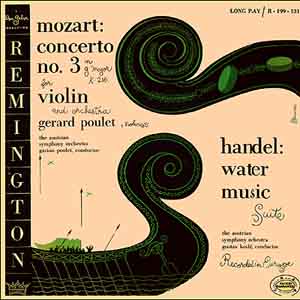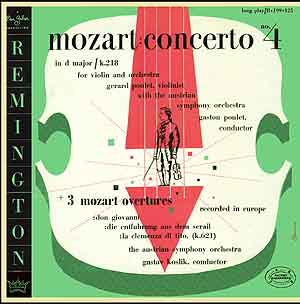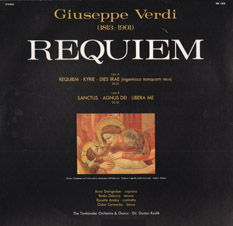|




Mozart:
Violin Concerto K 216 with Gérard Poulet was coupled with Handel's
Water Music conducted by Gustav Koslik

Mozart:
Violin Concerto K 218 with Gérard Poulet was coupled with 3 Mozart
Overtures conducted by Gustav Koslik
|
It
was on the afternoon of March 16, 1952, that in the Musikverein in Vienna
one of the famous Sunday Concerts took place. Gustav Koslik was conducting
the Tonkünstler Orchestra, the Tonkünstler Choir, and singers Ilona
Steingruber, Hilde Rössel-Majdan, Waldemar Kmentt and Walter Berry in
a performance of Giuseppe Verdi's Requiem.
Many attendees were impressed by the atmospheric performance, the board
of the orchestra included. Now the board decided to appoint Gustav Koslik
as the new principal conductor of the Tonkünstler Orchestra, as
successor of Kurt Wöss. Initially Koslik's style was criticized
by a few people; among these was conductor Hans Swarowsky, but sometime
later Swarowsky changed his opinion and spoke out in favor of the new
conductor.
 Kurt
Wöss, conductor of the Niederöstereichisches Tonkünstlerorchester from
1948 on, left Vienna in September, 1951, for Japan. He was going to
lead the prestigeous Japan Broadcasting Symphony Orchestra (NHK). As
of that date the Tonkünstler Orchestra did not have a principal
conductor. The board was undecided who to appoint. Various conductors
had swung the baton in front of the orchestra. There were Wilhelm Loibner,
Hine Arthur Brown, Alexander Paulmüller, and
Gustav Koslik,.
They all recorded for Remington Records, Koslik included.
Kurt
Wöss, conductor of the Niederöstereichisches Tonkünstlerorchester from
1948 on, left Vienna in September, 1951, for Japan. He was going to
lead the prestigeous Japan Broadcasting Symphony Orchestra (NHK). As
of that date the Tonkünstler Orchestra did not have a principal
conductor. The board was undecided who to appoint. Various conductors
had swung the baton in front of the orchestra. There were Wilhelm Loibner,
Hine Arthur Brown, Alexander Paulmüller, and
Gustav Koslik,.
They all recorded for Remington Records, Koslik included.
It
seems that the board was somewhat cautious for Gustav Koslik's contract
was renewed in the month of February of every following year and this
annual confirmation was repeated for 12 years until 1964 as is stated
in 'The Tonkünstler, Orchestra Stories from Vienna and Lower
Austria' (Die Tonkünstler, Orchestergeschichten aus Wien und Niederösterreich,
Residenz Verlag, Vienna and Salzburg, 2007.)
In the end Koslik's technique of conducting was much appreciated and
not only by the members of the orchestra.

After
that famous Sunday Concert, on the following day, Monday, March 17,
and on Tuesday as well, orchestra and chorus performed the Requiem once
again but now with Ilona Steingruber (soprano), Rosette Anday (contralto),
Ratco Delorco (tenor) and Oskar Czerwenka (bass). The performance was
taped by the crew of Marcel Prawy, producer for Remington Records Inc.,
New York.
The
hiring of Rosette Anday, Ratco Delorco, and Oskar Czerwenka (Cerwenka
as is printed on te Remington box), replacing Rössel-Majdan, Kmentt
and Berry, could have been for contractual reasons. Hilde Rössel-Majdan
and Waldemar Kmentt may have signed contracts with Westminster at the
time or they expected to sign up with this or another record label.
Whatever the reason, they did not appear on the 2 LP recording issued
as R-199-105/2 by Don Gabor the following year.
Although
the sound on the Remington discs leaves much to be desired, some of
what made the performance special during that Sunday afternoon concert
is shining through in the Remington recording. Typically the very slow
and careful approach must have given an atmospheric touch as felt by
the concert goers attending the performance. If the technical quality
of the recording had been at a higher level, more of its quality may
have reached the music listener's ears and mind.
David
Johnson is the author of The Mass since Bach, which is an
extensive article published in High Fidelity, May issue of 1958. Of
Verdi's Requiem there are 6 editions to be evaluated. He writes:
"Almost all commentaries on Verdi's only Mass center on the
question of whether or not it is sufficiently "religious."
Generally they conclude by saying that it is "sincere,"
which is not quite the same thing. The truth is that this massive
link between Aida and Otello is less an offering to God than to
the memory of Alessandro Manzoni, the Italian novelist whom Verdi
venerated as artist and patriot. He wanted to give Mazoni his best,
and his best was what he had learned as a journeyman in the theater
for thirty-five years. He was to find a voice wherewith to address
God at the very end of his life, after he had put the theater away
from him; but nobody, I think, would claim that those serene late
works are greater than the Manzoni Requiem." - David Johnson
|
A few
annotations from Johnson's review in order to get an idea of the early
1950s scene:
"The Decca set (originally Deutsche Grammophon, ed.) contains
excellent analytical notes by Francis Toye (as does the Angel),
the immaculate singing of the St. Hedwig's Choir, and a good soprano.
But the sound is muddy at climaxes, and Fricsay appears at a loss
in interpreting this very Italian music. The tenor, Helmut Krebs,
is a specialist when it comes to Monteverdi: when it comes to
Verdi he is a woeful failure.
The Angel set, despite the distinguished cast it boasts, is disappointing.
Recorded in June 1954, it does not reflect Angel's usual high
standards of engineering. De Sabata's orchestra plays better than
Fricsay's; but their fff attacks in the Dies Irae and elsewhere
are brutal rather than forceful (...).
For me the greatest performance of the Manzoni Requiem on records
is the oldest, the one conducted by Serafin. Originally issued
as an album of ten 78s, it represented some of the liveliest sound
the recording industry had then achieved. In its present reincarnation
(among Victor's "Vault Treasures" series) nothing of
that lively sound has been lost."
|
Johnson
confessed: "I have not heard the Remington set". And Warren
DeMotte's evaluation is that the Remington release has only a low price
as a recommendation. So there is one option and that is listening to
an excerpt of the Requiem Mass.

|
|
Click
here
for a Sound Clip of Requiem and Kyrie of Verdi's Requiem conducted
by Gustav Koslik taken from Remington R-199-150/2.
|
|
Giuseppe
Verdi: Requiem Mass
lona Steingruber (soprano), Rosette Anday (contralto), Ratko Delorco
(tenor), Oskar Cerwenka (bass); Austrian Chorus and Symphony, Gustav
Koslik, cond. REMINGTON R-199-105/2
 Read John Freeman's
liner notes written for the Remington release (pdf).
Read John Freeman's
liner notes written for the Remington release (pdf).
The recording
was later released on the Vibraton and Joker labels. But then the first
bars of the beginning (Requiem et Kyrie) that can be heard on Koslik's
Remington recording (and on many other performances available on Youtube)
were omitted. That indicates that the technicians who cut the masters
for the Vibraton made the mistake. That same edited tape was
used by the technicians who prepared the Joker LP.
|
|
|
|
Italian
issue from 1969 of the 1952 recording of Verdi's Requiem conducted
by Gustav Koslik on Vibraton
|
Italian
issue from 1982 of the 1952 recording of Verdi's Requiem conducted
by Gustav Koslik on Joker
|
Other
recordings of Gustav Koslik for Remington:
Wolfgang
Amadeus Mozart: Overtures (La clemenza de Tito; Don Giovanni; Die
Entführung aus dem Serail) REMINGTON R-199-125
Alexander
Borodin: Prince Igor Overture & Polovetsian Dances; Modest Mussorgski:
Night on Bald Mountain (coupled with Nicolai Rimsky-Korsakov Capricio
Espagnol conducted by Ernst Mehlich) REMINGTON R-199-130
Alexander
Borodin: Prince Igor Overture & Polovetsian Dances were also coupled
with Highlights from Kismet played by Tony Osborne and his Orchestra
and sung by Reg Gray and Glen Campbell on REMINGTON R-199-186
Georg
Friedrich Handel: Watermusic (coupled with Gérard Poulet's
performance of Violin Concerto K 216) REMINGTON R-199-131
According to the
short biography submitted by Alexander Rausch on the web site of the
 Austrian
Music Lexicon
Gustav Koslik was born on March 29, 1902 in Vienna and died September
1, 1989, in Essen, Germany. Koslik Studied musicology with G. Adler
at the University of Vienna and received a doctorate in 1925. He also
received piano, violin and theory lessons from the Kaiser Music School.
He began his career as a solo répétiteur and conductor
in Essen (1925-30). After engagements in the German cities Saarbrücken
(1930-35), Koblenz (1935-41) and Colmar (1941-44) he was general music
director at the Süddeutscher Rundfunk in Stuttgart (1946-48). He
led a conducting class there. From 1952 until 1963 he was chief conductor
of the Lower Austrian Tonkünstler Orchestra. From 1958 Koslik also
taught at the Conservatory of the City of Vienna. He retired in 1974.
Austrian
Music Lexicon
Gustav Koslik was born on March 29, 1902 in Vienna and died September
1, 1989, in Essen, Germany. Koslik Studied musicology with G. Adler
at the University of Vienna and received a doctorate in 1925. He also
received piano, violin and theory lessons from the Kaiser Music School.
He began his career as a solo répétiteur and conductor
in Essen (1925-30). After engagements in the German cities Saarbrücken
(1930-35), Koblenz (1935-41) and Colmar (1941-44) he was general music
director at the Süddeutscher Rundfunk in Stuttgart (1946-48). He
led a conducting class there. From 1952 until 1963 he was chief conductor
of the Lower Austrian Tonkünstler Orchestra. From 1958 Koslik also
taught at the Conservatory of the City of Vienna. He retired in 1974.
Rudolf
A. Bruil. Page first published on February 6, 2018.
|










